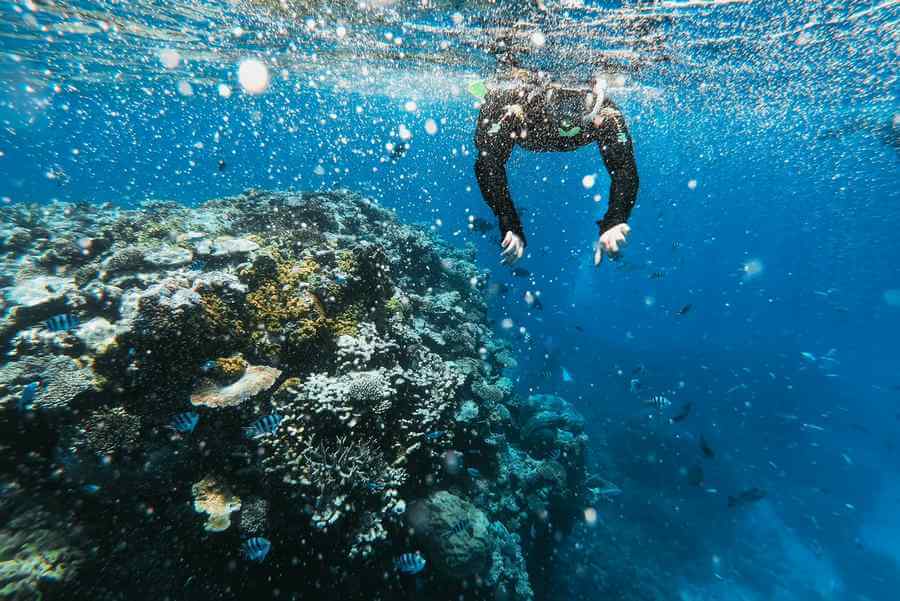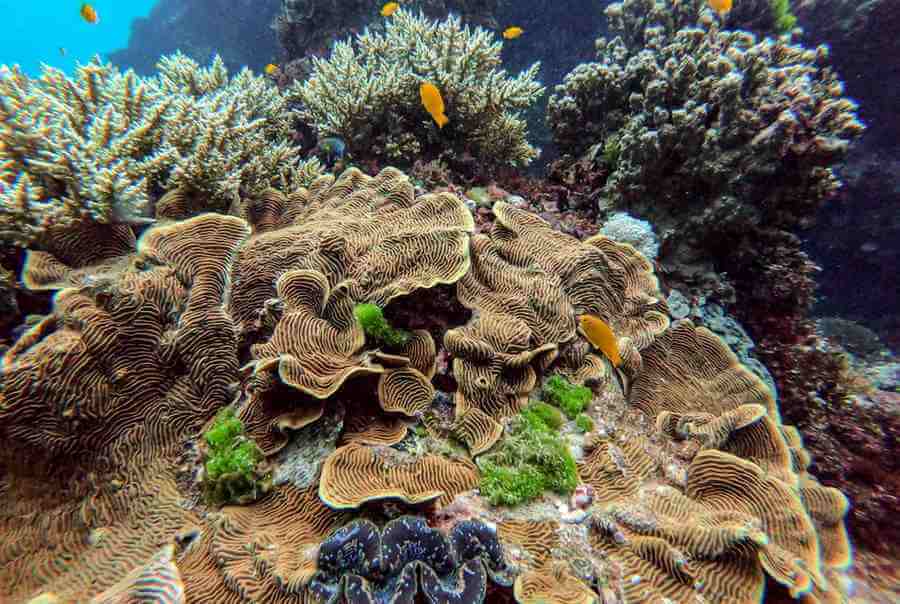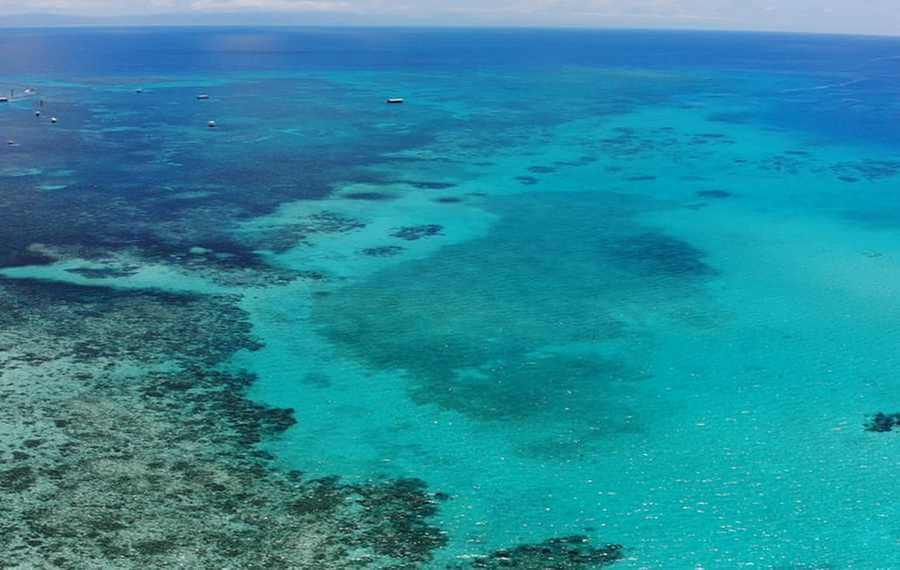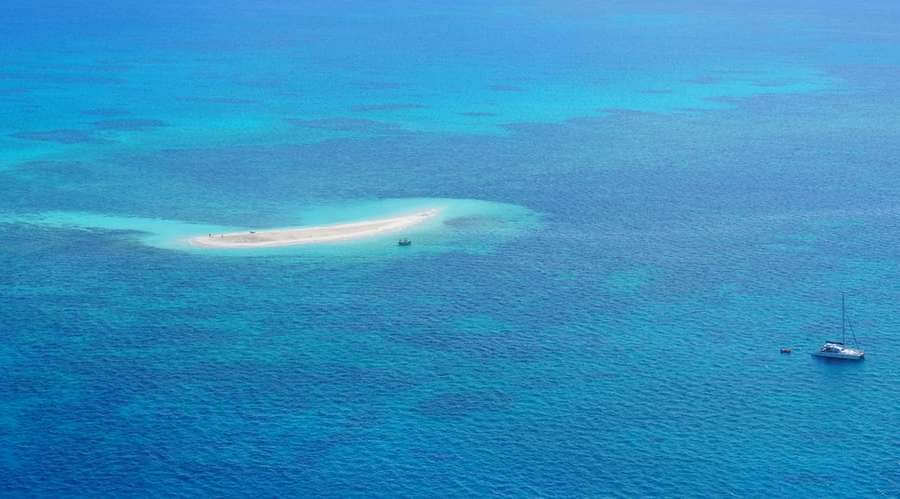The Great Barrier Reef in the Coral Sea


It is made up of 2,900 different coral systems with millions of coral polyps. The reef also encompasses an impressive 347,000 square kilometres of space and around 2,300 kilometres along the coastline.
Because of this size, there are so many gorgeous spots among the reef. Moreover, the size of the reef has created a very delicate and intricate ecosystem, many visitors come here just to scuba dive in its amazing waters!
This ecosystem is home to over 1,500 species of fish, other marine life like sea turtles and reef sharks, and obviously the coral itself.
This combination of life has made for an area of the world that needs to be preserved.
Even with such majestic beauty, the Great Barrier Reef does have various threats to it. These threats include Starfish, Global warming, Pollution and human life there has been a downgrade in the delicate ecosystem that has been created over the years.
Though it was discovered in 1770 by James Cook
It has aged beautifully, however, as the world changes, the threats to the reef do increase. It is important to keep this piece of historic underwater amazement as protected as possible.
This ensures that every possible step is being taken for keeping it alive and vibrant. When thinking about this, it is critical to understand what threats exist for the Great Barrier Reef.
What Are The Main Threats to the Great Barrier Reef
Understanding the threats to the Great Barrier Reef will help put some perspective on just how special this naturalistic wonder truly is. Below are the top threats to the reef that have been found throughout the years.

Starfish – Marine Animal Found At The Great Barrier Reef
Starfish is a common marine life animal to see among the reef, however, deadly outbreaks of them do occur on the Great Barrier Reef. These deadly outbreaks are swarms of starfish
These swarms devour far too much of the reef and endanger it. These outbreaks are said to happen either organically, from pollution, or from overfishing where their predator is no longer present.
Global Warming – Coral Bleaching At The Great Barrier Reef
There’s a lot of debate on whether global warming is real or not, however, when it comes to the Great Barrier Reef, the evidence is pretty clear. Global warming is a huge threat to the reefs because they are a direct cause of coral bleaching.
Coral bleaching
Pollution – Has Nitrogen Run-off Contributing To Starfish Outbreaks
Pollution blocks important sunlight that the corals need. Moreover, pollution is a heavy contributor to starfish outbreaks. This is because the pollution, which can have nitrogen run-off, may cause blooms of algal which attracts starfish.
Pollution is not only a threat to the reef but also the other marine life that lives around it.
Industrialisation – Increase In Shipping Traffic Threat To Coral
The building of ship ports is a huge threat to the Great Barrier Reef. This will increase the chances of dredging among the delicate coral reefs due to the increase in shipping traffic.
A Decrease In Water Quality Affects The Reefs
Pollution and industrialisation play a large part in the reduction of water quality. Pollutants and run-off from land is a large issue. The water quality around the reefs should be optimal to encourage a thriving ecosystem.
When the water quality is affected, so is the ecosystem is compromised. These also encourage the growth of algal blooms which once again, drive in the starfish outbreaks.
Fishing – Overfishing The Waters of The Great Barrier Reef
Overfishing is a huge problem that threatens the Great Barrier Reef. This directly impacts the coral reef because it can deplete the important marine life that calls the reef home.
These threats the biggest culprits to the depletion of the Great Barrier Reef’s colouring and overall quality of life. This is why conservation and protection of the Great Barrier Reef are absolutely important.
How Humans Affect the Great Barrier Reef
Humans affect the Great Barrier Reef in a few ways. One of the biggest ways is through pollution.
However, humans are said to affect the Great Barrier Reef through coal mining, overfishing, digging canals, just to name a few. Anything that disturbs the seafloor where the coral reefs are located can vastly affect the reef and its intricate ecosystem.
These are pretty big ways that humans affect the Great Barrier Reef. The Great Barrier Reef deserves to be protected and humans should take better care of it.
Any reduction in pollution, overfishing, and industrialisation will aid in these efforts! Natural wonders like the Great Barrier Reef are truly remarkable and should be admired as well as respected.
What’s Destroying the Great Barrier Reef?
The biggest threat to the Great Barrier Reef is climate change and global warming. While there are other factors endangering the Great Barrier Reef, climate change and global warming are making a big negative impact.
With rising sea temperatures, the coral reefs are losing their vibrant colouring and getting bleached.
Coral bleaching
This stress can eventually lead to the death of the coral. It is important to know that coral bleaching doesn’t immediately kill the coral. White or grey coral reef are more vulnerable now they’ve lost their colouring.

A healthy coral will work in conjunction with algae to be an active part of the ecosystem.
When coral bleaching happens, the warmer temperature of the waters causes the coral to contract and expel the algae on their surface. This results in the grey and white corals.
The loss of algae can also happen if there is a change in the light or nutrients. Coral needs a proper combination of sunlight and water temperature to keep its vibrant colourings.
Coral bleaching is a very serious problem that is out of our control. However, this is why taking care of the rest of the Great Barrier Reef is so critical. It is to ensure that it may not meet the same fate too quickly.
How Long Until the Great Barrier Reef Dies?
This is a hefty question, especially since the Great Barrier Reef has been around for somewhere around 500,000 years. With all the various threats that are posed against the Great Barrier Reef, is it possible to predict how long it may last?
The quick answer is yes. The percentage thought to be lost currently is pretty high and this pattern, or rate of loss, will give a time frame to the fate of the Great Barrier Reef. It is estimated the Great Barrier Reef may be gone by 2050.
While that doesn’t seem too far away, it is only 30 years away. Large percentages of the Great Barrier Reef have been lost in recent years.
Between 1986 and 2012, over half of the coral in the Great Barrier Reef was lost. To further examine this loss, the starfish outbreak (also known as the crown-of-thorns seastar) is responsible for a large portion of that.
Through the preserving of fish that eat these starfish, the reduction of the effect of these starfish has helped. This was done primarily through the reduction of overfishing.

More importantly, the loss of the Great Barrier Reef would also impact marine life. Considering that almost 30% of marine life calls the Great Barrier Reef home, the loss of it would be grave for these marine animals as well.
Throughout the years, the Great Barrier Reef has created such an incredible ecosystem and its loss would ultimately break down this ecosystem.
This makes it important to make continuous efforts towards protecting the Great Barrier Reef and its surrounding marine life. It may start with small efforts, but they add up! From reducing the threats to the Great Barrier Reef like overfishing and pollution, the reef can benefit from this.
While we cannot control global warming and the rising temperatures of the ocean, whatever we can do is still beneficial. Some things are just out of our control but the things we do for the reef will ensure we have peace of mind we are preserving it as much as possible!
As a natural wonder of the world, the Great Barrier Reef has shown mankind the real beauty of nature. Since its discovery back in 1770, the world has never been the same.
The Great Barrier Reef in Queensland, continually is the most desired spot for people to witness nature at its best. All we can hope for is that our efforts may keep it with us for as long as possible to come.
This may help future generations get to see this world wonder. While that cannot be a promise, it is a nice thought that it would be more than just a photo or distant memory!
Other Beach Related Topics
Not all beaches are suitable for swimming for a number of reasons. Some of these areas are more practical for sand activities or photography. It is important to know whether or not a beach is safe...
Visiting the beach is a beautiful opportunity to see mother nature at its best. There's nothing quite like hearing the waves rolling in on a soft, sandy shoreline. While visiting the beach is a...


